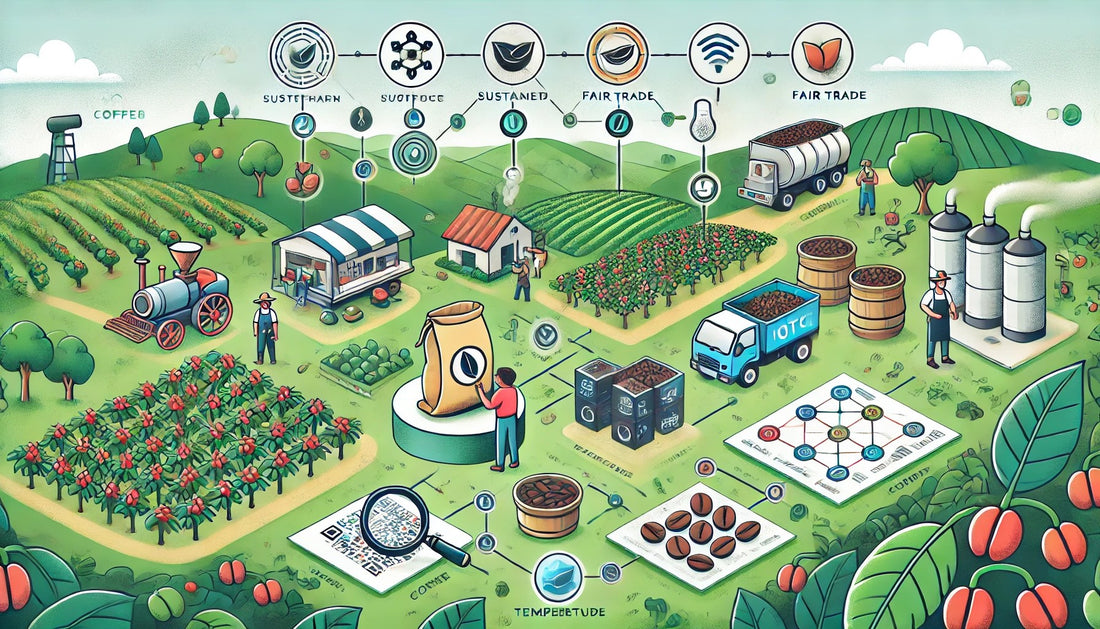As blockchain technology continues to evolve, its potential to transform the coffee industry becomes increasingly apparent. In previous articles, we explored the basics of blockchain, its importance for traceability, and the steps to implement it. Now, we look ahead to the future of blockchain in coffee, examining emerging trends, long-term benefits, and the potential for industry-wide adoption.
Evolving Trends in Coffee Traceability
Integration with emerging technologies is set to further enhance coffee traceability. Artificial Intelligence (AI) will play a significant role by analyzing blockchain data to predict market trends, optimize supply chains, and ensure compliance with ethical standards. Meanwhile, the Internet of Things (IoT) devices will become more sophisticated, providing even more granular data about coffee growing, processing, and shipping conditions, thus enhancing traceability. Additionally, the combination of blockchain with big data analytics will allow stakeholders to make more informed decisions based on comprehensive supply chain insights.
Consumer awareness is also on the rise, with ethical consumption becoming a major driver. Modern consumers demand transparency and ethical practices in their purchases, and blockchain provides the proof they need, building trust and loyalty. Brands are leveraging blockchain to educate consumers about the journey of their coffee, creating more engaged and informed customers who value the transparency offered by the technology.
Regulatory developments are another critical trend. Some governments are beginning to recognize the benefits of blockchain for ensuring food safety and traceability, leading to potential regulatory support and incentives for adoption. The establishment of industry-wide standards for blockchain implementation is also on the horizon, which will facilitate easier adoption and integration of the technology across the sector.
Long-term Benefits for the Coffee Industry
Blockchain technology promises to promote sustainable practices within the coffee industry. By tracking and verifying sustainable farming practices, blockchain can help reduce the industry’s carbon footprint and encourage environmentally friendly methods. Moreover, better data on resource use, such as water and fertilizers, will enable more efficient and sustainable farming techniques.
Economic stability for farmers is another significant benefit. Blockchain ensures that farmers receive fair compensation for their products by providing transparent pricing mechanisms and reducing the power of intermediaries. This transparency opens up global markets to smaller farmers, allowing them to sell their products directly to consumers or retailers who value transparency and ethical practices.
Enhanced quality control is a long-term benefit that blockchain brings to the coffee industry. Detailed tracking of each stage of the supply chain helps maintain consistent quality, from growing to roasting to brewing. Any quality issues can be quickly identified and addressed, minimizing waste and ensuring that only the best products reach consumers.
Predictions and Future Outlook
The evolution of blockchain technology is expected to continue, with future systems becoming more scalable, capable of handling larger volumes of transactions without compromising speed or efficiency. Interoperability between different blockchain platforms will improve, allowing seamless data exchange across various systems and networks. Additionally, blockchain platforms will become more user-friendly, making it easier for all stakeholders to participate in the technology.
New applications and integrations will emerge, creating more efficient and transparent supply chains. Fully automated supply chains powered by smart contracts will optimize every stage of production and distribution. The tokenization of digital assets representing ownership or provenance of coffee can facilitate trade and financing, offering new economic opportunities for stakeholders. Consumer platforms based on blockchain will allow for direct interactions between consumers and coffee producers, supporting crowd-funded projects and personalized coffee experiences.
A fully transparent coffee market is becoming increasingly likely, where every product can be traced back to its origin. This shift will be driven by consumer demand and regulatory pressure, establishing ethical and sustainable practices verified by blockchain as a standard requirement for all coffee products. Such transparency will ensure fair treatment of workers and environmental stewardship.
Encouraging Industry-wide Adoption
Promoting blockchain adoption in the coffee industry will require strategic collaboration. Industry leaders, governments, and NGOs need to work together to highlight the benefits of blockchain and support its adoption through incentives and education. Pilot programs can demonstrate the feasibility and advantages of blockchain, building confidence and providing blueprints for wider adoption. Public awareness campaigns will be essential in raising consumer awareness about the benefits of blockchain, driving demand for transparent and traceable products.
Industry leaders and policymakers will play a crucial role in fostering blockchain adoption. Leadership initiatives by industry giants, investing in blockchain technology, and setting an example for others to follow will drive adoption. Policymakers can create supportive regulatory frameworks that encourage blockchain adoption while ensuring security and privacy.
A unified approach involving all stakeholders will be essential to overcoming challenges and ensuring successful blockchain implementation across the industry. Developing shared blockchain platforms can reduce costs and complexity, making it easier for smaller players to participate and benefit from the technology.
The future of the coffee industry is bright with the promise of blockchain technology. By enhancing transparency, ensuring ethical practices, and improving efficiency, blockchain is set to revolutionize the way coffee is produced, traded, and consumed. Stakeholders across the supply chain must embrace this technology to build a more sustainable, fair, and transparent coffee market. The time to act is now—join the movement towards a fully traceable and trustworthy coffee industry.

